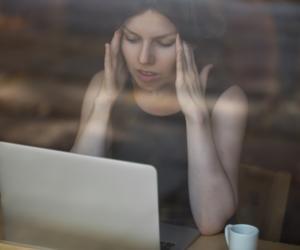Dizziness is a very common symptom associated with several medical conditions. Dizziness is typically associated with sensations such as feeling unsteady or woozy. It is also one of the most common reasons individuals visit their doctors.
Dizziness
1 What is dizziness?
2 Symptoms
The signs and symptoms of dizziness may include:
- Vertigo-false sensation that the world is spinning
- Lightheadedness or feeling faint
- Unsteadiness or loss of balance
- A feeling of floating, wooziness or heavy-headedness
- Nausea
Some symptoms may be triggered or made worse by walking, standing up or moving the head.
3 Causes
Some causes of dizziness include:
- Diseases of the heart, such as arrhythmias, heart attack, cardiomyopathy
- High or low blood pressure
- Bleeding disorders that cause anemia
- Diseases affecting the brain, such as stroke, tumor, headaches, migraine, dementia or confusion
- Using certain medications, such as blood pressure medications, antidepressants, sedatives, pain relievers and some antibiotics
- Metabolic disorders, such as dehydration and low blood sugar (hypoglycemia)
- Psychiatric disorders including depression, anxiety and panic disorder
- Endocrine diseases in which hormone producing organs, such as the thyroid, adrenal and pituitary glands are affected
- Allergic reactions which may cause wheezing or low blood pressure, or can trigger sinusitis which can result in dizziness
4 Making a Diagnosis
MRI and CT scan can help doctors to diagnos dizziness especially in patients who have suffered a stroke, older patients and patients with head injuries.
A physical exam and history of symptoms can also be helpful.
Hearing and balance tests can be also used. They include:
- Eye movement tests-in which a doctor asks a patient to track a moving object . Other eye exams require placing cold and warm water or air in the ear canal.
- Head movement testing ( Dix-Hallpike maneuver)-it is mostly used verify that vertigo is caused by benign paroxysmal positional vertigo.
- Posturography, a test to check which parts of the balance system that a patient relies on most. A patient might be asked to stand bare feet on a platform and try to keep balance under different conditions.
- Rotary-chair testing-a test in which a patient is asked to sit in a computer-controlled chair that moves very slowly in a full circle. It moves back and forth in a very small arc at faster speeds.
Other tests may also be carried out to look for other underlying conditions, such as infections.
5 Treatment
Most cases of dizziness do not require treatment. The body usually adapts to the cause of dizziness within a few weeks.
Treatments for dizziness that persists includes:
- Medications such water pills for conditions like Meniere's disease, Antihistamines, such as meclizine (Antivert) and anticholinergic, such as scopolamine drugs to reduce dizziness, anti-nausea drugs , anti-anxiety drugs , such as diazepam (Valium) and alprazolam (Xanax) and preventive medications for migraine.
- Head position maneuvers, such as canalith repositioning ( or Epley maneuver) to resolve benign paroxysmal positional vertigo more quickly.
- Balance therapy for people with dizziness due to disorders from the inner ear, such as vestibular neuritis.
- Psychotherapy for dizzines caused by anxiety.
Injections ofthe antibiotic gentamicin in the inner ear to disable the balance function. The unaffected ear takes over that function.
Labyrinthectomy
A surgical procedure in which the inner ear sense organ is removed. It disables the vistibular apparatus in the affected ear and the opposite ear takes over this function. This treatment is used for patients with serious hearing loss and dizziness that doesn't respond to other treatments.
6 Lifestyle and Coping
There are different ways to adapt your lifestyle in coping with dizziness.
The following tips can help patients to manage the symptoms of dizziness:
- Being aware of the possibility of losing balance, which can lead to falling and serious injury.
- Avoiding moving suddenly or walking with a cane for stability, if needed.
- Fall-proofing the home by removing tripping hazards, such as area rags and electrical cords.
- Sitting or lying down immediately after feeling dizzy.
- Avoid driving a car or operating heavy machines if a person experiences dizziness frequently.
- Avoiding caffeine, alcohol, salt and tobacco
- Eating a healthy diet and drinking plenty of fluids.
- Taking of-the-counter medications, such as antihistamines for nausea.
Resting in a cool place and drinking water or a sports drink (Gatorade, Powerade) if dizziness is caused by overheating or dehydration.
7 Risks and Complications
Risk factors for developing dizziness include being an older adult and a history of episodes of dizziness.
Dizziness can increase the risk of falls and injuries. Dizziness can also lead to motor vihecle accidents if it occurs when a person is driving.
Long-term consequences may occur if an underlying disease is causing dizziness.








